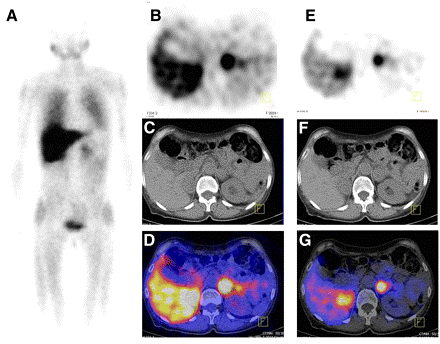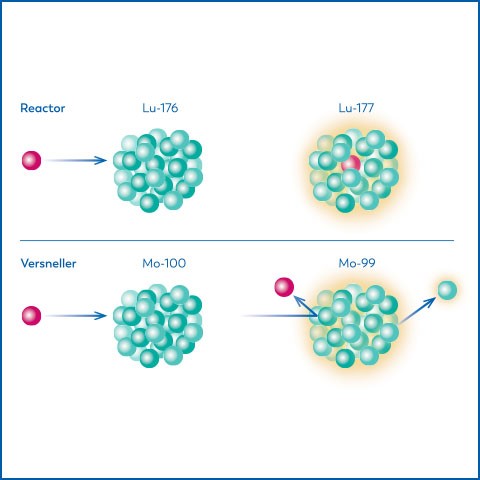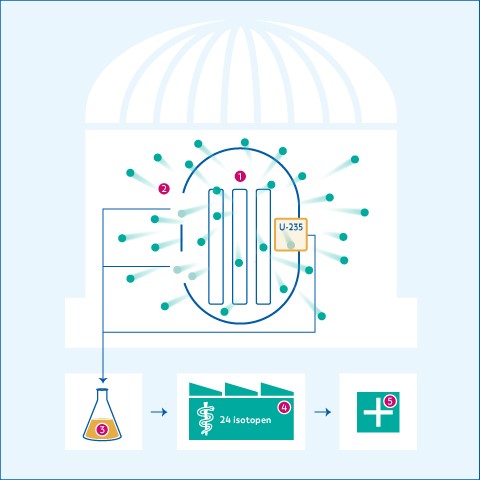All about medical isotopes
- Basic ingredient of nuclear medicine
- 48 million patients per year
- Diagnosis and treatment of cardiovascular diseases and cancer
All about medical isotopes
In diseases like cancer, patients may be referred to the nuclear medicine department or radiotherapy. Here, medical isotopes are used.
You may or may not have heard of medical isotopes. For a long time, it was not particularly relevant for patients and nuclear medicine specialists to know the origin of the medical isotopes, which are still used every day to save human lives.
Because saving human lives is what they do. Nuclear medicine specialists use radioactive material to determine whether organs are functioning properly and to detect cancerous growths at an early stage. Some diseases can also be treated with medical isotopes. In that case, radiation by isotopes is used as nuclear medicine to kill cancer cells.
With the production of these isotopes at risk in the future, more questions are being asked about what exactly medical isotopes are and how they are produced.
What are medical isotopes?
Medical isotopes, or radionuclides, are radioactive materials used in nuclear medicine. Nuclear medicine specialists use them to diagnose and treat various diseases, including cancer.
Medical isotopes form the basis - the active substance - for nuclear medicines. The medical isotope is linked to a molecular tracer. This means that the radioactive substance can be taken to the right place in the body. There, the radioactive substance emits what we call ionising 'radioactive' radiation.
When to use which isotopes?
What diseases are our medical isotopes used for? Meet Sem and Sofie who will tell you which medical isotopes are used in diseases of men and women.
Click on the 3D images below for a 3D image of the body. When you click on the numbered items, you will see a brief description of the organ, the disease and a reference to the medical isotope.
Read more?
Learn more?
Please get in touch with our press officer!

Cora Blankendaal
Press officer
Sem
Sofie
Diagnosis and treatment
Diagnosis
Using radiation, a 'photo' can be made, for example a PET or SPECT scan. These scans can reveal the function of organs and certain diseases can be diagnosed.
In diagnostics, fluor-18 is a commonly used isotope for PET scans. The molybdenum-99/technetium-99m is used in 80% of all nuclear medical interventions worldwide. As such, it is by far the most-used isotope for SPECT scans. In the Netherlands, the Mo-99 is applied around 300,000 times a year.
Treatment
The radiation can also be used to destroy tumour cells locally. This is what we call the therapeutic application. The development of new molecular tracers means more and more therapeutic applications. Therapeutic isotopes are used in the treatment of different types of cancer.


How are medical isotopes made?
For certain isotopes you need to add a particle to the atom in order to achieve the desired radioactive characteristics. That is only possible in a nuclear reactor.
For other isotopes you have to bounce off a particle from an atom to get the desired characteristics. This is only possible with a particle accelerator.
A particle accelerator does exactly what the name tells you: it accelerates particles. There are different types of particle accelerators. Linear and circular. A circular particle accelerator is called a cyclotron.
The majority of isotopes is made in nuclear reactors. In the reactor neutrons are made. But how do you make medical isotopes with that?
Making isotopes in a reactor
How does that work?
In a nuclear reactor, or isotope reactor, nuclear fission chain reactions take place in a controlled and stable environment. The reactor is fueled with low enriched uranium.
A cloud of neutrons is generated in the process of splitting uranium atoms. By colliding these neutrons on a target, this target can become radioactive.
This creates isotopes: artificial substances with radioactive properties that can be applied in medicine. Currently 24 reactor isotopes can be used for medical purposes. This number may increase in the future.

Decide for yourself.
Is a reactor necessary?Did you know radioactive radiation does not exist? Something can be radioactive, but it emits ionizing radiation.
